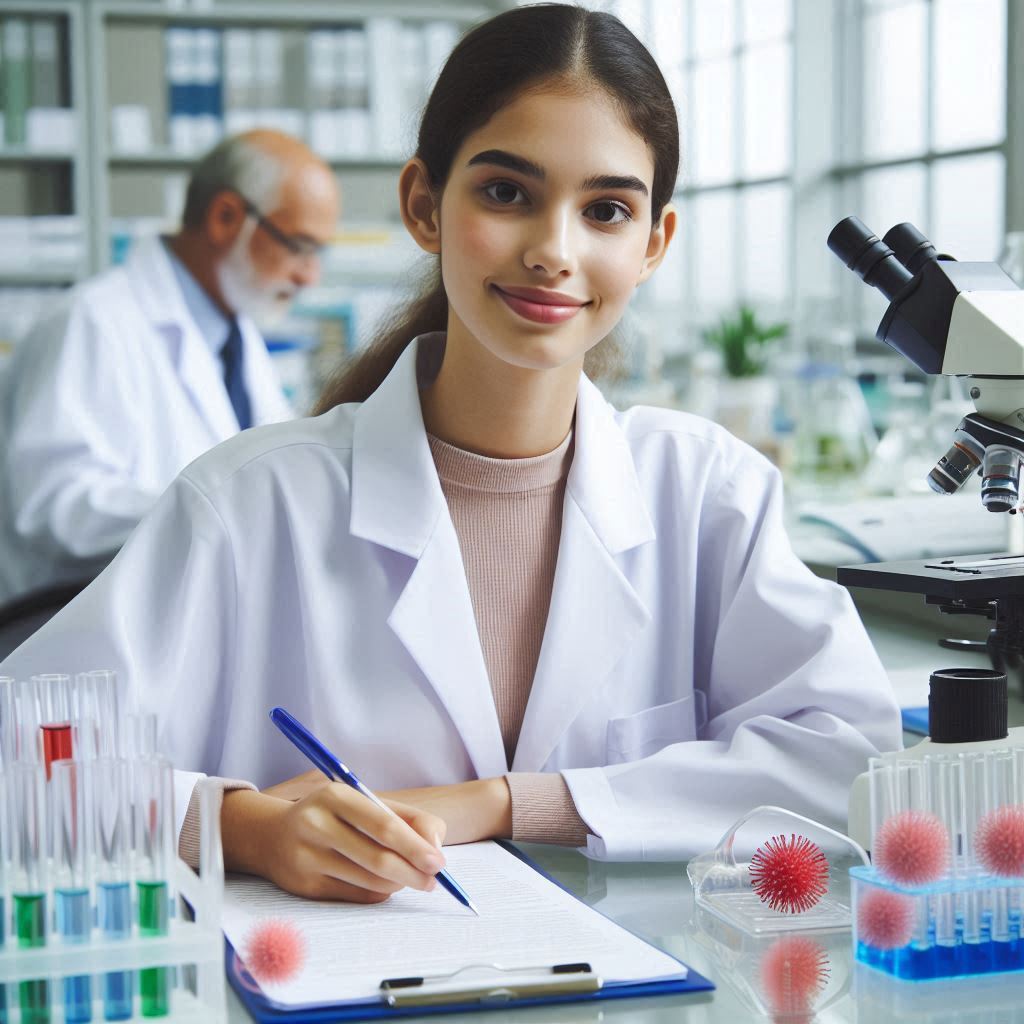Introduction
Microbiologists are scientists who study microorganisms, including bacteria, viruses, fungi, and parasites.
These tiny organisms play a significant role in various aspects of life, including human health.
Microbiologists examine how these organisms function, interact, and affect living beings.
Their work is crucial in understanding the complex relationships between microbes and their hosts, which is vital for public health.
Microbiologists significantly impact public health by identifying pathogens responsible for infectious diseases.
They utilize advanced laboratory techniques to diagnose infections quickly and accurately.
By tracking outbreaks, they can implement timely interventions to prevent widespread transmission.
Their research informs public health policies and strategies, helping to shape effective responses to emerging health threats.
In addition to identifying pathogens, microbiologists develop vaccines and treatments for various infections.
They collaborate with pharmaceutical companies to create effective immunizations that protect communities from diseases.
Furthermore, they conduct studies on microbial resistance to antibiotics, which is essential for developing new therapeutic approaches.
Microbiologists work in diverse settings, including laboratories, hospitals, and field environments.
They collect and analyze data on microbial populations to detect potential health threats.
Through their efforts, they help ensure safe food and water supplies, preventing foodborne illnesses and outbreaks.
Importance of Studying Microbiology
Relevance of understanding microorganisms in public health
Studying microbiology is crucial for understanding the role of microorganisms in public health.
Microorganisms, including bacteria, viruses, and fungi, significantly impact human health.
They can cause infections, influence immune responses, and affect overall well-being.
Understanding these microorganisms enables healthcare professionals to develop effective prevention and treatment strategies.
How microbiologists help in disease prevention
Microbiologists play a vital role in disease prevention.
They study pathogens and their interactions with hosts to identify risks.
This knowledge helps develop vaccines that protect against infectious diseases.
For example, microbiologists contributed to the development of vaccines for polio and measles, significantly reducing disease incidence.
Furthermore, microbiologists investigate antibiotic resistance, a growing public health concern.
By understanding these mechanisms, microbiologists can guide the appropriate use of antibiotics.
This helps preserve the effectiveness of existing antibiotics and informs the development of new treatment options.
Microbiologists identify harmful microorganisms in food products that can cause foodborne illnesses.
Regular inspections and testing help prevent outbreaks, protecting public health.
In addition, microbiologists contribute to environmental health.
They study the impact of microorganisms on ecosystems, which can influence human health.
For example, certain bacteria can degrade pollutants, improving water quality.
By understanding these processes, microbiologists can develop strategies for managing environmental health risks.
The relevance of understanding microorganisms extends to global health issues.
Microbiologists monitor and respond to emerging infectious diseases.
They track outbreaks and identify their sources, helping to control the spread of diseases.
This proactive approach is crucial in today’s interconnected world, where diseases can quickly cross borders.
Moreover, microbiologists work in public health laboratories, conducting research and diagnostic testing.
They help identify pathogens in clinical samples, enabling timely treatment.
This diagnostic capability is vital during outbreaks and pandemics.
Public health education also falls within the realm of microbiology.
Microbiologists play a critical role in disease prevention, food safety, and environmental health.
Their research and expertise help us understand microorganisms and their impact on human health.
By investing in microbiology, we can improve public health outcomes and safeguard communities against infectious diseases.
Read: U.S. Cities with the Most Opportunities for Environmental Scientists
Microbiologists in Infectious Disease Control
Microbiologists play a vital role in controlling infectious diseases.
They identify pathogens, study their behavior, and develop strategies to mitigate their effects.
Their expertise helps protect public health and prevent outbreaks.
How microbiologists identify and control infectious diseases
Microbiologists employ various techniques to identify infectious agents.
These methods include:
- Microscopy: Using microscopes, microbiologists visualize bacteria and viruses in samples.
- Culturing: They grow pathogens in controlled environments to study their characteristics.
- Molecular Techniques: Methods like PCR (Polymerase Chain Reaction) detect specific genetic material from pathogens, aiding in identification.
- Serology: This technique tests for antibodies in blood, helping identify past infections.
Through these methods, microbiologists can rapidly identify the cause of infections.
Timely identification is crucial for effective treatment and control measures.
Controlling Infectious Diseases
Once identified, microbiologists develop strategies to control the spread of infectious diseases.
Their approaches include:
- Vaccine Development: Microbiologists research and create vaccines that help the immune system recognize and combat pathogens.
Vaccination programs have successfully reduced diseases like measles and polio. - Antibiotic Resistance Studies: They analyze antibiotic resistance patterns in bacteria.
This information guides appropriate antibiotic use, ensuring effective treatment options remain available. - Surveillance: Microbiologists monitor disease outbreaks and track infection rates.
This surveillance allows for early intervention and resource allocation during outbreaks. - Public Education: They inform the public about hygiene practices and preventive measures, such as handwashing and vaccination.
Examples of successful interventions by microbiologists
Microbiologists have led numerous successful interventions in infectious disease control.
Here are some notable examples:
- Ebola Outbreak Response: During the 2014 Ebola outbreak, microbiologists played a key role in identifying the virus.
They helped develop a rapid diagnostic test, which significantly improved response efforts. - COVID-19 Pandemic: Microbiologists contributed to the rapid development of SARS-CoV-2 vaccines.
Their work in studying the virus‘s genetic structure paved the way for effective vaccines, saving countless lives. - HIV/AIDS Research: Microbiologists have significantly advanced our understanding of HIV.
Their research has led to antiretroviral therapies that transform HIV from a fatal disease to a manageable condition. - Foodborne Illness Control: Microbiologists investigate outbreaks of foodborne illnesses like salmonella.
They identify sources and develop guidelines to prevent future outbreaks, protecting public health.
Microbiologists play an essential role in infectious disease control.
Their ability to identify pathogens and develop strategies for prevention saves lives.
Through successful interventions, they significantly impact public health and improve community resilience against infectious diseases.
Read: Environmental Scientist vs. Ecologist: Roles and Differences in the US
Research and development in public health
How microbiologists contribute to the development of vaccines and treatments
Microbiologists are pivotal in advancing public health through their extensive research on pathogens, which are microorganisms that can cause disease.
Their work encompasses understanding the characteristics of various pathogens and their interactions with the human body.
This foundational knowledge is critical for developing effective vaccines, which stimulate the immune system to produce antibodies specific to these pathogens.
Microbiologists identify unique components of pathogens, like proteins or sugars on their surfaces.
They then design vaccines that prepare the immune system.
This preparation helps the immune system recognize and combat infections before they take hold.
Moreover, microbiologists investigate the immune response elicited by vaccines.
They study how different populations respond to vaccines, considering factors like age, genetic background, and existing health conditions.
This research helps ensure that vaccines are effective across diverse demographics, maximizing their impact on public health.
In addition to vaccine development, microbiologists contribute significantly to treating infectious diseases.
They study the mechanisms of action of various drugs and antibiotics, exploring how these treatments can inhibit the growth or replication of pathogens.
By testing these drugs, microbiologists identify the most effective treatment protocols for various infections.
This process ultimately improves patient outcomes.
Impact of microbiologists in combating emerging infectious diseases
The emergence of new infectious diseases represents one of the most pressing challenges in public health today.
Microbiologists are at the forefront of this battle, playing a critical role in identifying and characterizing novel pathogens.
Their expertise is essential for developing effective prevention and treatment strategies that can mitigate the impact of these threats.
Advanced technologies, such as genomics and molecular biology, have transformed microbiological research.
Microbiologists can now analyze the genetic makeup of emerging pathogens, providing insights into their structure, function, and behavior.
This genetic information is invaluable for understanding how these pathogens spread, evolve, and adapt to different environments.
By identifying genetic markers associated with virulence or resistance, microbiologists can develop targeted interventions to control outbreaks more effectively.
Collaboration is another key aspect of the microbiologist’s role in public health.
They often work alongside other professionals, such as epidemiologists and public health officials, to monitor the spread of infectious diseases.
By integrating their scientific knowledge with public health strategies, microbiologists help formulate effective response plans to emerging threats.
In short, microbiologists are integral to advancing public health, working diligently to develop vaccines, treatments, and strategies to combat infectious diseases.
Their innovative research and commitment to science significantly impact global health outcomes, especially in addressing the challenges posed by emerging pathogens.
As new infectious diseases emerge, microbiologists play a crucial role in protecting populations.
They help prevent outbreaks and ensure effective treatment options remain available.
Their work demonstrates the importance of scientific inquiry and collaboration in fighting infectious diseases.
Microbiologists play a crucial role in creating a healthier, safer world for everyone.
Read: The Relationship Between U.S. Policy & Environmental Scientist Roles

Environmental Health and Sanitation
Microbiologists play a crucial role in monitoring and improving environmental health.
Their work directly impacts sanitation, clean water, and food safety.
Here‘s how they contribute to these vital areas.
How microbiologists monitor and improve environmental health
Microbiologists use advanced techniques to monitor environmental samples.
They assess air, water, and soil for microbial contamination.
Regular testing helps identify harmful pathogens that threaten public health.
Some key tasks include:
- Collecting Samples: Microbiologists gather samples from various environments.
This includes rivers, lakes, and urban areas. - Conducting Tests: They perform laboratory tests to detect microbial presence.
These tests can identify bacteria, viruses, and other pathogens. - Analyzing Data: Microbiologists analyze the data to determine contamination levels.
They assess the risk to human health and the ecosystem. - Reporting Findings: They communicate their findings to relevant authorities.
This ensures timely interventions and public awareness.
Role of microbiologists in ensuring clean water and food safety
Access to clean water is essential for public health.
Microbiologists help ensure that water sources remain safe for consumption.
Their roles include:
- Water Quality Testing: They regularly test drinking water for contaminants.
This helps detect pathogens like E. coli and Giardia. - Developing Treatment Methods: Microbiologists work on improving water treatment processes.
They research effective methods to eliminate pathogens. - Collaborating with Authorities: They partner with local and national agencies.
Together, they develop policies for safe drinking water standards. - Educating Communities: Microbiologists educate communities about safe water practices.
They inform the public about the importance of clean water and hygiene.
Food Safety Assurance
Food safety is another critical area where microbiologists make an impact.
Their work helps prevent foodborne illnesses. Key activities include:
- Testing Food Products: Microbiologists conduct tests on food items.
They check for harmful microorganisms like Salmonella and Listeria. - Implementing Safety Protocols: They develop safety protocols for food handling and processing.
These protocols help reduce contamination risks in food supply chains. - Conducting Inspections: Microbiologists inspect food establishments.
They ensure compliance with health regulations and sanitation standards. - Researching Foodborne Pathogens: They study the behavior of pathogens in food environments.
This research helps develop better prevention strategies.
Microbiologists are essential to maintaining environmental health and sanitation.
Their efforts in monitoring water and food safety protect public health.
Through testing, research, and community education, they play a vital role in preventing disease outbreaks.
By ensuring clean water and safe food, microbiologists contribute significantly to healthier communities.
Their work supports a safer and cleaner environment for everyone.
Read: Organizations & Associations for Environmental Scientists in the USA
Transform Your Career Today
Unlock a personalized career strategy that drives real results. Get tailored advice and a roadmap designed just for you.
Start NowCollaboration with other health professionals
Microbiologists play a crucial role in public health by collaborating with various health professionals.
Their expertise helps prevent and control infectious diseases.
This section explores how microbiologists work with epidemiologists, physicians, and other health experts, emphasizing the importance of interdisciplinary teamwork.
How microbiologists work with epidemiologists, physicians, and other health experts
Microbiologists and epidemiologists work closely to track and analyze disease outbreaks.
They share vital data on pathogens and their transmission routes.
This collaboration enhances outbreak investigations by:
- Identifying Sources: Microbiologists help pinpoint the origins of infections, enabling faster response to outbreaks.
- Understanding Transmission: They provide insights into how diseases spread, aiding in developing effective control measures.
- Informing Public Health Policies: Together, they create guidelines to mitigate risks and protect communities.
Partnering with Physicians
Microbiologists also collaborate with physicians to improve patient care.
This partnership ensures accurate diagnoses and effective treatment plans.
Key areas of collaboration include:
- Laboratory Testing: Microbiologists conduct tests to identify pathogens, guiding physicians in prescribing the right medications.
- Clinical Research: They work together on research projects that explore new therapies and treatment protocols.
- Continuing Education: Microbiologists provide training sessions for physicians on the latest advancements in microbiology and infectious diseases.
Engaging with Other Health Experts
Microbiologists engage with a wide range of health experts beyond epidemiologists and physicians.
This collaboration fosters a comprehensive approach to public health challenges.
Important partnerships include:
- Public Health Officials: Microbiologists help design and implement health programs aimed at preventing diseases.
- Environmental Scientists: They work together to study the impact of environmental factors on public health.
- Veterinarians: Microbiologists and veterinarians collaborate to understand zoonotic diseases, which can transfer between animals and humans.
Importance of interdisciplinary teamwork in public health initiatives
Interdisciplinary teamwork enhances the effectiveness of public health initiatives.
By collaborating across various fields, health professionals can tackle complex health issues.
Benefits of this teamwork include:
- Enhanced Problem-Solving: Diverse perspectives lead to innovative solutions for public health challenges.
- Improved Communication: Open lines of communication facilitate swift responses to emerging health threats.
- Resource Optimization: Collaborative efforts maximize resources, ensuring efficient use of time and funding.
Microbiologists significantly impact public health through collaboration with other health professionals.
Their partnerships with epidemiologists, physicians, and various health experts strengthen disease prevention and control efforts.
Interdisciplinary teamwork fosters innovation, communication, and resource optimization, ultimately leading to healthier communities.
Education and Public Outreach
Role of microbiologists in educating the public about infectious diseases
Microbiologists play a crucial role in public health education.
They provide vital information about infectious diseases and preventive measures.
Through their expertise, they help communities understand the science behind microorganisms.
This knowledge empowers individuals to make informed health decisions.
One significant aspect of microbiologists’ work is educating the public about infectious diseases.
They explain how these diseases spread and how to prevent them.
For instance, they may discuss the transmission of viruses and bacteria during community workshops.
These interactions create awareness about hygiene practices that can reduce disease outbreaks.
How microbiologists engage with communities to promote health and hygiene practices
Microbiologists often collaborate with schools to educate students.
They develop engaging programs that introduce children to microbiology concepts.
By teaching kids about germs, hygiene, and vaccination, they promote lifelong healthy habits.
These programs instill an understanding of personal responsibility in preventing infections.
In addition to schools, microbiologists partner with local health departments.
They organize community seminars to discuss pressing public health issues.
These events allow them to share research findings and best practices.
Community members learn about disease prevention, vaccination, and healthy lifestyle choices.
Microbiologists also utilize social media platforms for outreach.
They share information about infectious diseases and public health updates.
Through engaging posts and infographics, they reach diverse audiences.
Moreover, microbiologists engage in targeted outreach during outbreaks.
They inform the public about specific health risks associated with certain pathogens.
By providing accurate and timely information, they help communities respond effectively.
Their expertise can guide people on proper hygiene and vaccination protocols.
To further their outreach efforts, microbiologists often develop educational materials.
They create brochures, videos, and online resources that explain complex concepts simply.
They encourage individuals to adopt preventive measures to protect themselves and others.
Furthermore, microbiologists often participate in health fairs and community events.
They set up booths to provide information and answer questions.
Microbiologists significantly impact public health through education and outreach.
They inform the public about infectious diseases and promote health practices.
Their efforts create healthier communities, equipping individuals with knowledge to prevent infections.
By engaging with schools, health departments, and local events, they foster a culture of health awareness.
This proactive approach ultimately leads to a healthier society.
Delve into the Subject: Wildlife Rehabilitation: Role of Zoologists in Recovery
Conclusion
Microbiologists play a vital role in safeguarding public health.
Their research helps identify harmful pathogens and develop effective treatments for infectious diseases.
By understanding the biology of microorganisms, they can pinpoint the causes of outbreaks and devise strategies to contain them.
Microbiologists contribute significantly to disease prevention through vaccination programs and public awareness campaigns.
Their work in vaccine development has led to the eradication of diseases like smallpox and the control of polio.
They also educate the public about hygiene practices that reduce the spread of infections, such as handwashing and safe food handling.
In addition, microbiologists monitor antibiotic resistance, guiding the appropriate use of medications.
They study how bacteria evolve and adapt, providing crucial information that helps clinicians prescribe the right antibiotics.
This research is essential in combating the growing threat of superbugs that resist conventional treatments.
Ongoing microbiological research is essential for addressing emerging health threats.
New pathogens continually arise due to factors like climate change, globalization, and urbanization.
Understanding the behavior and impact of these microorganisms is crucial for effective response strategies.
Continued investment in microbiological studies enhances our ability to respond to public health challenges.




